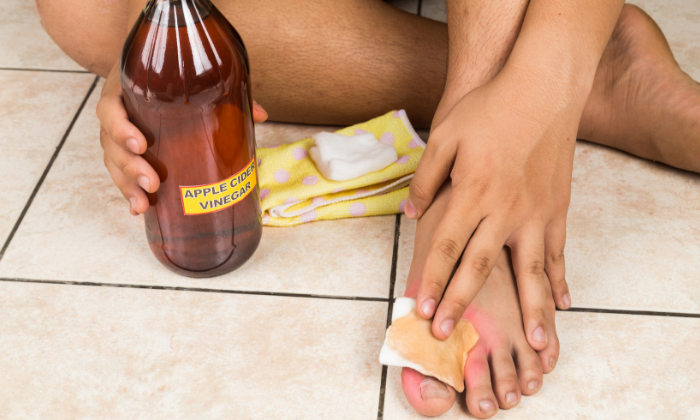How to Tell the Difference Between Nummular Eczema and Ringworm
It’s often difficult to distinguish between nummular eczema and ringworm, so it’s always best to be evaluated by a dermatologist, say experts.

Published On: Dec 13, 2018
Last Updated On: Jul 15, 2021
From deep-cleaning your hair to salad dressing extraordinaire, it only takes a quick Google search to know there is no shortage of uses for apple cider vinegar (ACV).
Apple cider is basically fermented apple juice. When we add yeast to apple juice, it turns the fruit sugar into alcohol—a process known as fermentation. Bacteria then turns the alcohol into acetic acid, which is what gives apple cider vinegar its sour taste and strong smell.
Although ACV doesn’t have much nutritional value, we see it pop up in quite a few recipes, particularly soups, sauces and salad dressings. Apple cider vinegar also has a hefty history outside of the kitchen as a folk remedy in the health and beauty realms.
Vinegar has been used as a remedy since the days of Hippocrates, when the ancient Greek doctor used it to disinfect and treat wounds. Other than that, ACV pretty much remained an elusive old wives’ tale for centuries until it regained traction in the 1970s as a means to promote weight loss, regulate blood sugar and, yes, even treat eczema.
Before we answer that, it should be noted that there is little to no scientific evidence proving the health benefits of ACV. When consumed in large quantities, ACV can actually be harmful.
Due to its high acidic content, it could potentially injure the soft tissues of the mouth, throat, stomach and kidneys. Women who are pregnant are discouraged from consuming large amounts of ACV.
As to whether ACV helps eczema, the answer is … possibly. Healthy skin is protected by an acidic barrier. Scientists theorize that people with eczema have elevated skin pH levels. Anything under a pH of 7.0 is acidic, and anything above 7.0 is alkaline. Healthy skin has a natural pH level under 5.0. People with eczema typically have higher pH levels than those without.
Because people with eczema have elevated pH levels, the acidic skin barrier doesn’t function as it should. Without a proper functioning skin barrier, moisture escapes and irritants are allowed in. Our skin’s acidity levels are also related to a breakdown in the skin’s microbiota, which guards us against bad bacteria. That’s why people with AD are prone to staph infections— they have higher levels of staph bacteria colonized on their skin.
Since ACV is a mild acid, some people with eczema theorize that applying ACV topically may help restore their skin’s natural pH level. There could be some truth to that.
Washing our skin with soaps and other cosmetic products significantly raises the skin’s pH level, which might explain why eczema is often triggered by soaps and detergents. Even tap water can decrease skin’s acidity, which is why people with eczema-prone skin tend to break out when they shower in unfamiliar locales.
Be sure to consult with your doctor before trying apple cider vinegar on your skin for the first time. This is especially important for parents of infants or small children with eczema. It is often advised to start with a small patch test and wait few days to ensure you don’t experience an adverse reaction.
https://nationaleczema.org/complementary-alternative-medicine-101/